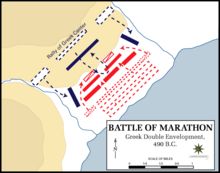490 BC
| Millennium: | 1st millennium BC |
|---|---|
| Centuries: | |
| Decades: | |
| Years: |
| 490 BC by topic |
| Politics |
|---|
| Categories |
| 2401 before ROC 民前2401年 | |
| Nanakshahi calendar | −1957 |
| Thai solar calendar | 53–54 |
| Tibetan calendar | 阳金狗年 (male Iron-Dog) −363 or −744 or −1516 — to — 阴金猪年 (female Iron-Pig) −362 or −743 or −1515 |

Year 490 BC was a year of the pre-Julian Roman calendar. At the time, it was known as the Year of the Consulship of Camerinus and Flavus (or, less frequently, year 264 Ab urbe condita). The denomination 490 BC for this year has been used since the early medieval period, when the Anno Domini calendar era became the prevalent method in Europe for naming years.
Events
By place
Greece
- Darius I sends an expedition, under Artaphernes and Datis the Mede, across the Aegean to attack the Athenians and the Eretrians. Hippias, the aged ex-tyrant of Athens, is on one of the Persian ships in the hope of being restored to power in Athens.
- When the Ionian Greeks in Asia Minor rebelled against Persia in 499 BC, Eretria joined Athens in sending aid to the rebels. As a result, Darius makes a point of punishing Eretria during his invasion of Greece. The city is sacked and burned and its inhabitants are enslaved. He intends the same fate for Athens.
- Miltiades. Some 6,400 Persians are killed at a cost of 192 Athenian dead. Callimachus, the war-archon of Athens, is killed in the battle. After the battle, the Persians return home.
- Before the Battle of Marathon, the Athenians send a runner, Pheidippides, to seek help from Sparta. However, the Spartans delay sending troops to Marathon because religious requirements (the Carneia) mean they must wait for the full moon.
- The Greek historian Herodotus, the main source for the Greco-Persian Wars, mentions Pheidippides as the messenger who runs from Athens to Sparta asking for help, and then runs back, a distance of over 240 kilometres[1] each way.[2] After the battle, he runs back to Athens to spread the news and raise the spirits. It is claimed that his last words before collapsing and dying in Athens are "Chairete, nikomen" ("Rejoice, we are victorious").
- Hippias dies at Lemnos on the journey back to Sardis after the Persian defeat.
- Agiad house, his half-brother, Leonidas.
Europe
- Carthaginian navigator Himilco is the first known explorer from the Mediterranean Sea to reach the northwestern shores of Europe (approximate date).
By topic
Architecture
- The Athenians begin the building of a temple to Athena Parthenos (approximate date).
- Stelae are once again allowed in Athenian cemeteries, having been banned since 510 BC.
Births
- Empedocles, Greek philosopher (d. c. 430 BC)
- Zeno of Elea, Greek philosopher (d. c. 430 BC)
Deaths
- Hippias, tyrant of Athens
- Callimachus, war-archon of Athens
- gens Claudia
- Pheidippides, messenger and soldier of Athens
References
Wikimedia Commons has media related to 490 BC.
- ^ International Spartathlon Association Archived June 29, 2008, at the Wayback Machine
- ^ The Great Marathon Myth Archived August 28, 2009, at the Wayback Machine
